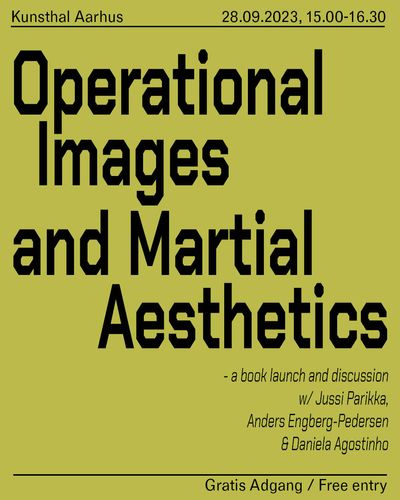–
Book launch and discussion: Operational Images and Martial Aesthetics
–
Join us for a book launch with Jussi Parikka (Aarhus), Anders Engberg-Pedersen (Odense), and Daniela Agostinho (Aarhus) to discuss two new books: Operational Images and Martial Aesthetics. In a conversation led by Agostinho, the authors will address some of the links between digital aesthetics and images, media culture and war, but also other forms of violence through concepts and ideas from philosophy to contemporary visual culture and art.
Operational Images by Parikka stems from a multi-year research project on transformations of photography and technical visual culture drawing on Harun Farocki’s pioneering artistic work. Martial Aesthetics by Engberg-Pedersen examines the historical merger of aesthetics and warfare: it addresses how military discourses and war media from star charts, horoscopes, and the Prussian wargame to contemporary synthetic training environments and theories of military design are entangled with ideas of creativity, genius, and possible worlds in philosophy and aesthetic theory.
→ Participation is free, but we recommend securing a seat here.
The event is hosted by Kunsthal Aarhus and the Digital Aesthetics Research Centre (DARC) at Aarhus University and it is co-organised with the Aesthetic Seminar also at Aarhus University.
BIOGRAPHIES
Daniela Agostinho is Assistant Professor at Aarhus University. She works in the fields of visual and digital culture, and artistic and curatorial research, with a focus on colonial archives; care and display of contested heritage; and artistic responses to war and imperial histories. At Aarhus University, she is co-founder of the research unit Postcolonial Entanglements and the Center for Critical Data Practices. She is co-editor of the books (W)archives: Archival Imaginaries, War, and Contemporary Art (Sternberg Press, 2020) and Uncertain Archives: Critical Keywords for Big Data (MIT Press, 2021). She currently co-directs the network Reparative Encounters: a transcontinental network for artistic research and reparative practices with colleagues from Denmark, the US Virgin Islands, Ghana and Kalaallit Nunaat.
Anders Engberg-Pedersen is Professor of Comparative Literature at the University of Southern Denmark, Chair of Humanities at the Danish Institute for Advanced Studies, and Director of the Nordic Humanities Center. He is the author of Empire of Chance - The Napoleonic Wars and the Disorder of Things (Harvard University Press, 2015), Martial Aesthetics: How War Became an Art Form (Stanford University Press, 2023 – a German translation is forthcoming with Konstanz University Press in 2024), and he has edited and co-edited numerous volumes, most recently War and Literary Studies (Cambridge University Press, 2023), and War and Aesthetics: Art, Technology, and the Futures of Warfare (MIT Press, forthcoming 2024). He also serves as editor of the book series Prisms: Humanities and War with MIT Press.
Jussi Parikka is professor in Digital Aesthetics and Culture at Aarhus University where he is also the director of the Digital Aesthetics Research Centre as well as the co-director of the new research program Environmental Media and Aesthetics. For the past five years he led the research project Operational Images and Visual Culture at the Academy of Performing Arts, Prague. His earlier books include Digital Contagions (Peter Lang Inc, 2007/2016), Insect Media (University Of Minnesota Press, 2010), What is Media Archaeology? (Polity Press, 2012), A Geology of Media (University Of Minnesota Press, 2015), and The Lab Book (University of Minnesota Press, 2022, co-authored). In addition, he has published several co-edited volumes, such as Photography Off the Scale (Edinburgh University Press, 2021). Parikka’s books have been translated into 11 languages including Japanese, Korean, Chinese, Czech, Italian, French, Spanish and Portuguese.
More info here.
